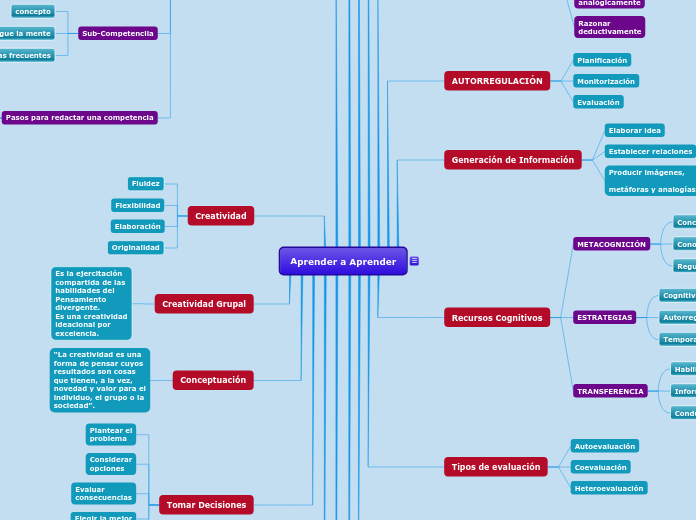ESTUDIANTE: CENTENO GARCIA ALEXIS JOEL
Aprender a Aprender
- Centeno García Alexis Joel
Marine life, sea life or ocean life, is represented by the plants, animals and other organisms that live in the saltwater of the sea or ocean, or the brackish water of coastal estuaries.
At a fundamental level, marine life affects the nature of the planet. Marine organisms produce oxygen and sequester carbon.
Qué es una situación de problema
Aquella situación para la
cual un individuo no está
capacitado para ofrecer
una solución inmediata a
la misma,
Resolver Problemas
Valorar los resultados
Planificar y verificar
la solución elegida
Elegir la mejor solución
Predecir
consecuencias
Generar soluciones
Representar el
problema
Tomar Decisiones
Fish are limbless cold-blooded vertebrate animal with gills and fins living wholly in water.
Factores de decisiones
Presión
personas
Presión social
Elegir la mejor
Evaluar
consecuencias
Considerar
opciones
Plantear el
problema
Conceptuación
“La creatividad es una
forma de pensar cuyos
resultados son cosas
que tienen, a la vez,
novedad y valor para el
individuo, el grupo o la
sociedad”.
Creatividad Grupal
Marine invertebrates lack a vertebral column, and some have evolved a shell or a hard exoskeleton. Some of them can collect bacterias or even absorb harmful components. For instance, sea sponges are able to take in the excess amount of ammonium in the ocean water.
They have more than 10,000 species, name a few that are the most common.
Es la ejercitación
compartida de las
habilidades del
Pensamiento
divergente.
Es una creatividad
ideacional por
excelencia.
Creatividad
Marine plants consist of two major types, the seagrasses, and the algae and seaweeds.
Seagrasses represent members of some of the more complex plants, while algae and seaweeds display simple forms and are often microscopic.
Gather information about marine plants:
- What do marine plants need to survive?
- What is the importance of marine algae?
- How long do aquatic plants live?
Originalidad
Elaboración
Flexibilidad
Fluidez
Competencia
A coral reef is an underwater ecosystem characterized by reef-building corals. Reefs are formed of colonies of coral polyps held together by calcium carbonate. Most coral reefs are built from stony corals, whose polyps cluster in groups.
The 3 main types of reef are: atoll, barrier reefs, fringing reefs.
Write down their characteristics as well as the importance of the reefs
Pasos para redactar una competencia
- Where are fringing reefs found?
- How is it formed?
- What animals live in fringing reefs?
Meta
Procedimiento
Objetivo
verbo en infinitivo
Sub-Competenciia
- What is a barrier reef?
- How is it formed?
- Where are barrier reefs located?
dificultades mas frecuentes
pasos que sigue la mente
concepto
Competencia aprender a aprender
*regular el proceso de aprendizaje.
* comprender y evaluar la información que se recibe.
* generar nueva información.
* tomar decisiones.
* resolver problemas.
Competencias básicas
Aprendizajes que
toda persona debe
alcanzar para
realizarse, integrarse
en la sociedad y
conseguir un empleo.
Tecnologías de la información y comunicación
Autonomía e iniciativa personal
Habilidades sociales
Aprender a aprender y a pensar
Conocimiento cultural y artístico
Conocimiento e interacción con el mundo físico
Matemáticas
Comunicación lingüística
Capacidad para responder a demandas
complejas y llevar a cabo de forma adecuada.
- How does an atoll form?
- Where are atolls found?
- Can people live on an atoll?
Competencias Universitarias
Específicas
Genéricas
Metacognitivas
Tecnológicas
Socio/afectivas
Pensar activamente en entorno educativos
DESPUES
Aprender
Comunicar
Evaluar
DURANTE
Verificar
ANTES
Decidir
Generar
Identificar
Reunir y organizar
Tipos de evaluación
Heteroevaluación
Coevaluación
Autoevaluación
Recursos Cognitivos
TRANSFERENCIA
Conductas
Información
Habilidades
ESTRATEGIAS
Temporalización
Autorregulación
Cognitivas
METACOGNICIÓN
Regulación
Conocimiento
Conciencia
Generación de Información
Producir imágenes,
metáforas y analogías
Establecer relaciones
Elaborar idea
AUTORREGULACIÓN
Evaluación
Monitorización
Planificación
Evaluar Información
Razonar
deductivamente
Razonar
analógicamente
Predecir efectos
Interpretar causas
Investigar fuentes
Comprender información
Marine mammals are aquatic mammals that rely on the ocean and other marine ecosystems for their existence.
They include animals such as seals, whales, manatees, sea otters, and polar bears. They are an informal group, unified only by their reliance on marine environments for feeding.
Secuenciar
- Do they live in water all the time?
- How dense is sea otters' fur?
- What do sea otters eat?
- What is a group of otters called?
Sintetizar
- How big are dolphins?
- What do dolphins eat?
- How are dolphins different from fish?
- Where do dolphins live?
Analizar
- Why are they called sea cows?
- Where do they live?
- How long can they stay underwater?
- Can manatees live on land?
- Do manatees sleep underwater?
Clasificar
- How are seals and sea lions alike?
- Are seals or sea lions aggressive?
- Why are sea lions called sea lions?
- What is a group of seals called?
Comparar
- How big are whales?
- What do whales eat?
- How are whales different from fish?
- Where do whales live in the world?
- What are whales known for?
Interacción
Seabirds are birds that are adapted to life within the marine environment. While seabirds vary greatly in lifestyle, behavior, and physiology, they often exhibit striking convergent evolution, as the same environmental problems and feeding niches have resulted in similar adaptations.
Name a few of bird species who live at sea or at the seaside:
Tareas del
mundo real
Estructuras
mentales
Aplicación de conocimientos y
recursos
Currently, of the approximately 12,000 extant reptile species and subspecies, only about 100 are classed as marine reptiles: extant marine reptiles include marine iguanas, sea snakes, sea turtles and saltwater crocodiles.
utilizando procesos cognitivos y
socio-afectivos
Sea snakes, or coral reef snakes, are a subfamily of venomous elapid snakes, that inhabit marine environments for most or all of their lives. Most are extensively adapted to a fully aquatic life and are unable to move on land.
Research, then write down facts about sea snakes, for e.g. how fast they swim, what do they eat or how long they live, etc.

